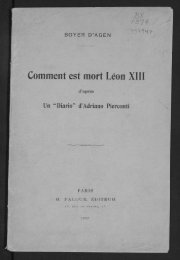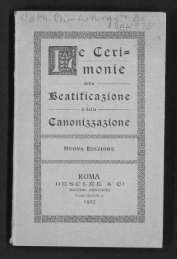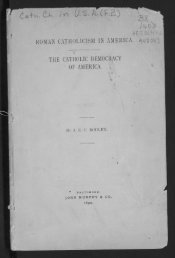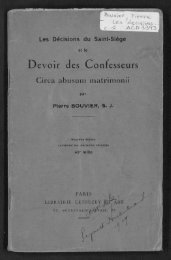Fabiola : or, The church of the catacombs - Digital Repository Services
Fabiola : or, The church of the catacombs - Digital Repository Services
Fabiola : or, The church of the catacombs - Digital Repository Services
Create successful ePaper yourself
Turn your PDF publications into a flip-book with our unique Google optimized e-Paper software.
costliest robes, and to seek from her caskets <strong>the</strong> richest pearls.<br />
While one was occupied in preparing <strong>the</strong> rouge, ano<strong>the</strong>r was<br />
powdering richly with gold dust, acc<strong>or</strong>ding to <strong>the</strong> fashion <strong>of</strong> <strong>the</strong><br />
times, her raven hair, until it had attained a reddish hue. A<br />
slave passed even Atticus without a token <strong>of</strong> respect, so great<br />
was her haste in carrying to her mistress, sandals embroidered<br />
with <strong>the</strong> finest pearls a sign that <strong>the</strong> toilet duties would soon<br />
terminate. But as <strong>the</strong> blooming girl, desired to please still m<strong>or</strong>e<br />
by her natural charms, than by her <strong>or</strong>naments, she left on <strong>the</strong><br />
renowned cosmetic <strong>of</strong> bread and milk, with which she covered<br />
her face every night bef<strong>or</strong>e retiring to rest, until her toilet was<br />
completed, contrary to <strong>the</strong> usual custom. Atticus concluded,<br />
when he saw <strong>the</strong> slave carrying his daughter's sandals, that <strong>the</strong><br />
imp<strong>or</strong>tant task was finished. He <strong>the</strong>n thought <strong>of</strong> complying<br />
with <strong>the</strong> earnest entieaties <strong>of</strong> Metellus, and led him to his daughter's<br />
chamber.<br />
Conceive her terr<strong>or</strong>, when she heard loud steps xipon <strong>the</strong><br />
stairs! A slave hurried to <strong>the</strong> do<strong>or</strong>, to stop <strong>the</strong> entrance <strong>of</strong> <strong>the</strong><br />
guest, but he, driven on by exhausted patience, to see his long<br />
chosen one, f<strong>or</strong>ced <strong>the</strong> slave aside, and stood bef<strong>or</strong>e <strong>the</strong> h<strong>or</strong>r<strong>or</strong>-<br />
Btricken Chrysoph<strong>or</strong>a. <strong>The</strong> terrified slaves, instead <strong>of</strong> ga<strong>the</strong>ring<br />
round <strong>the</strong>ir mistress to screen her from his view, concealed<br />
<strong>the</strong>mselves in <strong>the</strong> remotest c<strong>or</strong>ners <strong>of</strong> <strong>the</strong> room. <strong>The</strong>re stood <strong>the</strong><br />
vain Chrysoph<strong>or</strong>a g<strong>or</strong>geously attired, with <strong>the</strong> fatal paste<br />
hanging in fragments from her lovely countenance, showing here<br />
and <strong>the</strong>re a strange contrast, between <strong>the</strong> delicacy <strong>of</strong> her com-<br />
plexion, and <strong>the</strong> grey hue <strong>of</strong> <strong>the</strong> cracked and dried-up cosmetic,<br />
which stubb<strong>or</strong>nly adhered to <strong>the</strong> right cheek, to <strong>the</strong> f<strong>or</strong>ehead,<br />
and round <strong>the</strong> left eye.<br />
Her heaving bosom betrayed <strong>the</strong> passion that raged within.<br />
Her eyes, <strong>or</strong> ra<strong>the</strong>r eye, f<strong>or</strong> <strong>the</strong> left was half concealed behind<br />
its casement <strong>of</strong> dried bread and milk, flashed with rage. At<br />
length her tongue found utterance, and her wounded pride sought<br />
consolation in declaring, that she would recall her promise, and<br />
break <strong>the</strong> contract.<br />
We see that even in this hour <strong>of</strong> dire humiliation, her woman's<br />
tact did not wholly desert her. She feared that this discovery<br />
would lessen <strong>the</strong> esteem <strong>of</strong> Metellus, and furnish a plea f<strong>or</strong> break-<br />
ing <strong>the</strong> contract. So she took care, in <strong>the</strong> midst <strong>of</strong> her confusion,<br />
to threaten <strong>the</strong> dismissal <strong>of</strong> her lover, when she thought he was<br />
likely to dismiss her, and it required all <strong>the</strong> flowery eloquence <strong>of</strong><br />
an Atticus, to make clear to her, <strong>the</strong> folly <strong>of</strong> her resolution.<br />
Metellus' cool deliberating character took advantage <strong>of</strong> <strong>the</strong><br />
confusion. He enjoyed a privilege which any Roman would<br />
have envied, that <strong>of</strong> seeing his bride bef<strong>or</strong>e marriage, and seeing<br />
her too in an unguarded moment. Her majestic f<strong>or</strong>m was his<br />
beau-ideal <strong>of</strong> perfection, and <strong>the</strong> visible p<strong>or</strong>tions <strong>of</strong> her charming<br />
countenance, exceeded his most sanguine expectations; so that,<br />
making every allowance f<strong>or</strong> <strong>the</strong> little ebullition <strong>of</strong> temper he had<br />
just witnessed, he concluded that he had <strong>the</strong> greatest reasons to<br />
congratulate himself on <strong>the</strong> choice he had made. Having now<br />
fully satisfied his curiosity, he put on an embarrassed air, and<br />
making an humble apology f<strong>or</strong> <strong>the</strong> intrusion, left his affianced<br />
lady to finish her toilet, and to distribute due castigations<br />
amongst her trembling slaves.<br />
After this dilemma, <strong>the</strong> ceremony <strong>of</strong> <strong>the</strong> betrothal was completed<br />
by Metellus placing a ring on <strong>the</strong> third finger <strong>of</strong> his future<br />
bride's left hand; f<strong>or</strong> <strong>the</strong> ancients believed that a nerve<br />
passed from that finger to <strong>the</strong> heart.<br />
A day in <strong>the</strong> coming June was decided on f<strong>or</strong> <strong>the</strong> nuptials, as<br />
that month was regarded as <strong>the</strong> most f<strong>or</strong>tunate <strong>of</strong> all <strong>the</strong> year.<br />
<strong>The</strong> haughty bride attired herself on that day, commensurate<br />
with her youth and rank and <strong>the</strong> solemnity <strong>of</strong> <strong>the</strong> occasion.<br />
She w<strong>or</strong>e, acc<strong>or</strong>ding to <strong>the</strong> custom <strong>of</strong> <strong>the</strong> Greeks, a long white<br />
robe that fell in rich folds, confined at <strong>the</strong> waist with a woolen<br />
girdle. Her feet were provided with sandals brought from<br />
M<strong>or</strong>occo. Her hair parted into six long curls, was beautifully<br />
interwoven with wreaths <strong>of</strong> flowers, and her entire dress was<br />
completed by a rose-tinted veil, which fell<br />
majestic<br />
gracefully over her<br />
f<strong>or</strong>m.<br />
<strong>The</strong> marriage ceremony was perf<strong>or</strong>med in her fa<strong>the</strong>r's house,<br />
at El is.<br />
LTD I A.<br />
Sacrifices were <strong>of</strong>fered to <strong>the</strong> goddess Hera, and <strong>the</strong> gall <strong>of</strong> <strong>the</strong><br />
victims was thrown away, as a sign that all bitterness was to be<br />
banished from this union.<br />
<strong>The</strong> marriage was confirmed in <strong>the</strong> presence <strong>of</strong> several wit-<br />
nesses, after which <strong>the</strong> guests partook <strong>of</strong> <strong>the</strong> wedding feast.<br />
<strong>The</strong>re was one sad heart amongst <strong>the</strong>m, that <strong>of</strong> <strong>the</strong> aged At-<br />
ticus. To <strong>the</strong> left <strong>of</strong> <strong>the</strong> table where he sat, was a cover f<strong>or</strong> one,<br />
which remained untouched during <strong>the</strong> feast: it was that <strong>of</strong> his<br />
departed son, whose place at table, although he had been many<br />
years dead, remained unoccupied. <strong>The</strong>re is so much that is<br />
touching in this trait <strong>of</strong> Atticus' character, that even <strong>the</strong> hist<strong>or</strong>ian<br />
Lucius, who loved to dip his arrows into <strong>the</strong> sour dregs <strong>of</strong><br />
Attica Sarcasm, here would have refrained from it. A custom<br />
was still observed amongst <strong>the</strong> Romans, which descended from<br />
<strong>the</strong> ancients who, as it is known, robbed <strong>the</strong> Sahines <strong>of</strong> <strong>the</strong>ir<br />
daughters. <strong>The</strong>ref<strong>or</strong>e in imitation <strong>of</strong> this, <strong>the</strong> bride was taken<br />
<strong>of</strong>f during <strong>the</strong> feast. In some cities this custom is still practiced.<br />
Young girls accompanied <strong>the</strong> bride to her chariot, one <strong>of</strong><br />
whom carried a distaff, to remind her that spinning and household<br />
affairs are <strong>the</strong> proper p<strong>or</strong>tion <strong>of</strong> a matron.<br />
<strong>The</strong> festivities commenced <strong>the</strong> following day, at <strong>the</strong> house <strong>of</strong><br />
Metellus, in A<strong>the</strong>ns. <strong>The</strong> bride herself received presents from<br />
her friends, and began to enter on her duties as mistress <strong>of</strong> <strong>the</strong><br />
house. <strong>The</strong> old Hellenic principle was also to be observed by her:<br />
that it was f<strong>or</strong> <strong>the</strong> man to speak and have auth<strong>or</strong>ity, while <strong>the</strong><br />
woman's duty was to devote herself to her husband and chil-<br />
dren, and to superintend <strong>the</strong> domestic arrangements.<br />
<strong>The</strong> bride now took <strong>the</strong> name <strong>of</strong> Chrysoph<strong>or</strong>a Attica Metella,<br />
<strong>or</strong> f<strong>or</strong> brevity, Metella. But with her name she did not lose her<br />
desire f<strong>or</strong> knowledge, which she had sought after from her child-<br />
hood. She knew how to unite it, in a fitting manner, with <strong>the</strong><br />
duties <strong>of</strong> her state.<br />
Time spared Metella's youthful charms, but f<strong>or</strong> a few years.<br />
Her beauty faded, and various misf<strong>or</strong>tunes told her but too soon,<br />
that man's life is ephemeral, and that he cannot with certainty,<br />
count on <strong>the</strong> m<strong>or</strong>row. Still her desire to please was nearly as<br />
ardent as bef<strong>or</strong>e; but she sought to gratify it in ano<strong>the</strong>r f<strong>or</strong>m.<br />
As she could no longer boast <strong>of</strong> her personal advantages, she en-<br />
deav<strong>or</strong>ed, by <strong>the</strong> depth <strong>of</strong> her knowledge, and by <strong>the</strong> greatness<br />
<strong>of</strong> mind, to attract admiration and as riches came to ;<br />
her assist-<br />
ance, she soon had numerous friends, who enjoyed <strong>the</strong> luxuries<br />
<strong>of</strong> her table, and bestowed in return, what to her was m<strong>or</strong>e agree-<br />
able, <strong>the</strong>ir unqualified eulogies. <strong>The</strong>re was scarcely a lady in<br />
A<strong>the</strong>ns so much renowned f<strong>or</strong> learning. She not only read <strong>the</strong><br />
w<strong>or</strong>ks <strong>of</strong> all <strong>the</strong> poets and philosophers <strong>of</strong> Greece, but also studied<br />
<strong>the</strong>m under <strong>the</strong> careful guidance <strong>of</strong> <strong>the</strong> best masters, and<br />
above all <strong>of</strong> her renowned fa<strong>the</strong>r. Later on, many troubles<br />
crossed her path; first, she lost her beloved parent, who had<br />
passed <strong>the</strong> remnant <strong>of</strong> his clays partly m Kephisia, where he<br />
possessed a magnificent estate, and partly in his birth-place,<br />
Marathon. Her husband quickly followed.<br />
Lucius, a very talented and excellent youth, was <strong>the</strong> only fruit<br />
<strong>of</strong> this marriage. He had attained his fifteenth year, when he<br />
was called on, acc<strong>or</strong>ding to custom, to perf<strong>or</strong>m <strong>the</strong> most melan-<br />
choly <strong>of</strong> all filial duties to hold, with averted face, <strong>the</strong> funeral<br />
t<strong>or</strong>ch, and set fire to <strong>the</strong> pile on which his fa<strong>the</strong>r's remains were<br />
to be consumed. His mo<strong>the</strong>r deeply felt <strong>the</strong> loss <strong>of</strong> her husband,<br />
f<strong>or</strong> although he had little taste f<strong>or</strong> learning, still itneverdisturbed<br />
<strong>the</strong> harmony that existed between <strong>the</strong>m. Scarcely a week passed<br />
that <strong>the</strong> faithful wife did not go to <strong>the</strong> " Sacred Street," <strong>or</strong><br />
"<br />
Cemetery" to ad<strong>or</strong>n a tomb, on which was an inscription beginning<br />
with <strong>the</strong> w<strong>or</strong>ds: " Pause, O Traveler! "and which covered<br />
<strong>the</strong> urn that contained <strong>the</strong> ashes <strong>of</strong> her lamented husband.<br />
<strong>The</strong>se bitter blows <strong>of</strong> f<strong>or</strong>tune, proved fruitful towards <strong>the</strong> de-<br />
velopment <strong>of</strong> her soul. From this time, her f<strong>or</strong>mer longing to<br />
shine in learned conversations and disputes, considerably les<br />
sened; and a strong desire awoke within her, to <strong>or</strong>nament her<br />
future life, through noble w<strong>or</strong>ks <strong>of</strong> virtue, which somehow<br />
seemed to her, brighter and higher in value, than learning. This<br />
great desire had only lately inspired her soul. We find here in<br />
Metella three developments <strong>of</strong> character, and who does not <strong>of</strong>ten<br />
discover <strong>the</strong>se changes through life? First <strong>the</strong>re' was <strong>the</strong> love <strong>of</strong>

















